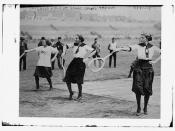MORAL CHARACTER AND CHEATING IN SPORT
Andreia, sophrosyne, dikiaosyne and sadphronesis; those familiar with ancient Greek language are aware that these are the four virtue ethics of ancient Greece, translating: courage, temperance, justice, and wisdom, accordingly. In Greek philosophy it was thought that these virtues are related, if not completely unified: to have one is to have them all [3]. To speak of ethical virtue, the emphasis is not on mere distinctiveness or individuality, but on the combination of qualities that make an individual a sort of morally admirable person; having good moral character. When applying this to sport, Ancient Greek philosophers, such as Plato, Socrates, and Aristotle believed sporting contests elicit those cardinal values, and that was the main purpose of sport [3].
When considered, sporting events create tasks that are intrinsically meaningless, or in other words, set-up challenges that act as a mechanism for generating and celebrating the very human qualities that enable a person to excel in life's challenges, as opposed to simply setting one man above the rest [3].
If that was sports' original purpose, it would not matter who the opponents were and it would not be a goal of sporting events, such as the Olympics to set the best competitors in the world against each other. If you were to make comparisons between modern sport and ancient Greek ideals, looking at the strive for moral ethics as the stem of drive for athletes, you would see that for a large portion of athletes that is their reason for competing in sporting events [3]. Money and entertainment play a large contribution in popular sport; however they are not the fundamental purposes for sport. Athletes who experience high level competition do not need to be pushed hard to understand that the fundamental structure of...


